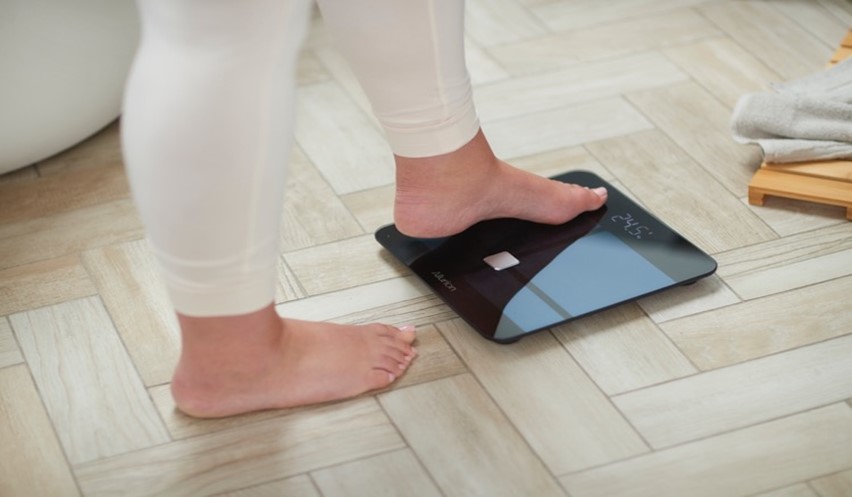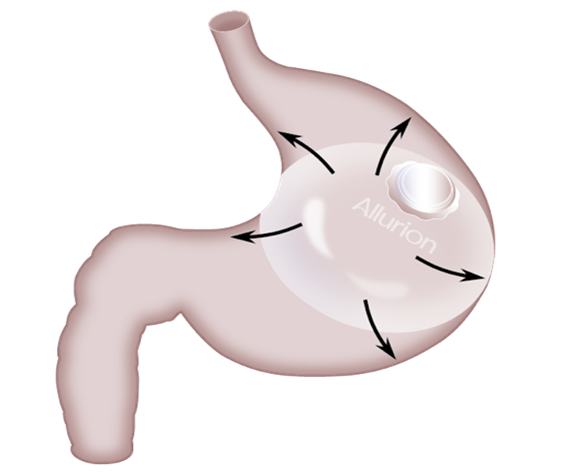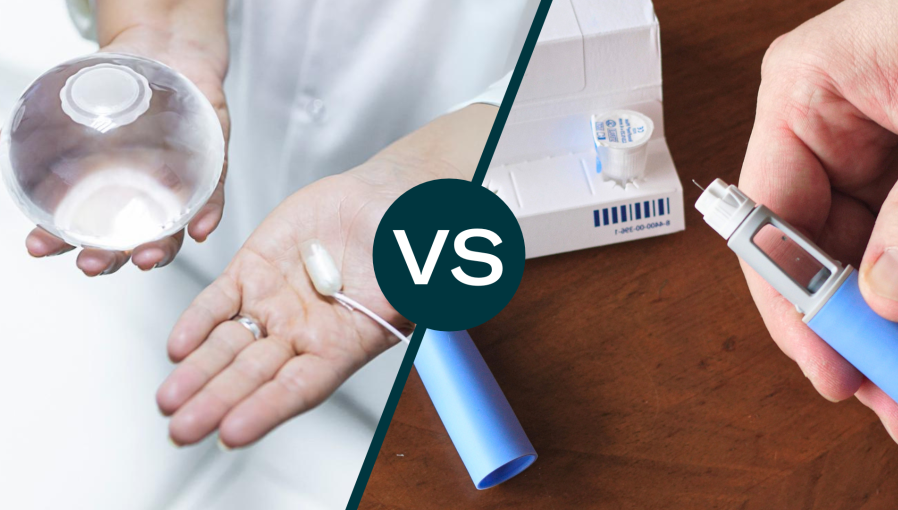Managing Menopause and Weight Gain

Menopause affects half the world’s population at some stage in their lives. Yet there is little discussion about its impact on day-to-day lives. Perhaps you are undergoing menopause yourself, or you know someone who is currently in menopause.
Healthy lifestyle changes – including effective weight management – can help ease the burden of menopause for millions of women every day. In this article, we talk about how menopause affects weight, how weight loss can help with menopausal symptoms and how the Allurion Programme can help you with losing weight.
What is menopause?
Menopause is a natural stage of life – most woman experience it. It’s when her periods stop, meaning her ovaries are no longer releasing eggs and she can no longer get pregnant naturally.1 But it doesn’t happen overnight. It’s a gradual transition that for some women can take many years.1
Three main stages broadly make up what we call menopause:2,3
- Perimenopause: These are the years before menopause, when periods may become irregular, and symptoms start setting in. It’s a transition phase and there is no set timeline in terms of when it starts or how long it lasts before the menstrual cycle stops altogether.
- Menopause: A woman is in menopause when she has not had a period for 12 months.
- Postmenopause: This is the time after a woman’s periods have stopped. Symptoms may have eased or have even stopped, but, again, it differs from person to person.
What causes menopause?
Menopause is a natural part of ageing. As a woman gets older, the balance in her hormone levels changes.1 The ovaries produce less of the hormone estrogen, which in turn means her ovaries release fewer eggs as part of the menstrual cycle. Eventually, the ovaries stop releasing eggs altogether, which means the body also stops having a period.1 After 12 months without a period, a woman is technically in menopause.3
When does menopause happen?
Menopause usually happens between the ages of 45 and 55 as estrogen levels fall, but there are no hard and fast rules.1
About 1 in 100 women experience early menopause, often for no apparent reason. For others, it’s brought on by ovarian surgery, cancer treatment or an underlying health condition.1
Regardless, perimenopause can last a few months or many years. One in 10 women experience the symptoms of menopause for up to 12 years.1
What’s the connection between menopause and weight?
Firstly, it’s helpful to point out that, on average, people tend to experience weight gain as they get older. Our body composition changes too. From the age of 30, muscle mass in the body tends to decrease 3-8% every decade – this is, of course, on average and there are ways to prevent and minimize these changes. They’re not inevitable.5
Why is this important? Because as muscle decreases over time, our bodies tend to have more fat. More fat and less muscle mean less muscle strength – and that’s bad news if our activity levels and our diets aren’t adjusted as we get older to offset these changes. In short, less muscle mass means fewer calories are needed each day to power the body.6,7,8

For women, this tendency for weight to increase during midlife coincides with menopause – and often also a decrease in day-to-day exercise and activity levels as life slows down or lifestyles change.9
Estrogen usually helps to regulate the body’s hunger signals, helping to regulate food intake. During menopause, changing estrogen levels mean that this regulation is less effective, leading to stronger hunger signals and in turn, likely increase in food intake. This can all ultimately lead to weight gain.10
In addition, studies show that the hormonal changes that start with perimenopause also – and separately – contribute to increased storage of fat around the abdominal area.10
It’s little surprise, then, that a recent poll found that weight gain is the no.1 concern for many women when to comes to menopause.11

How the Allurion Programme can help with weight control during menopause
At Allurion, we recognize the challenges of weight control during menopause. As with other stages of life, weight loss and weight management during menopause require more than fad diets or exercise alone. They require tangible lifestyle changes that can be maintained over the longer term.17
The Allurion Programme helps women not only shed the kilos, but also maintain a healthier weight and lifestyle over the long term. And this process can start before, during or after menopause.
At the center of the Allurion Programme is a revolutionary gastric balloon that creates a feeling of fullness. The Allurion Balloon is designed to help you reduce food intake by taking up space in your stomach.

Customised nutrition plan for menopausal weight gain
In addition to the Allurion Balloon, the 6-month Allurion Programme includes medical support and individual nutritional coaching, helping you adjust your eating habits. Our clinic teams and specialists work together to develop a customised nutrition and activity plan to both prevent and help manage symptoms for women experiencing the side effects of menopause, including reflux, indigestion, bloating, constipation and nausea.

Digital weight loss tools to motivate and track
In addition to ongoing input from your healthcare team, there are a number of Allurion digital tools which also support your weight loss journey.
The Allurion Connected Scale measures body weight, as well as body composition, including fat tissue (% total body weight that consists of fat tissue), visceral fat (fat that is stored around your abdomen) and muscle tissue (% body weight that consists of muscle tissue).

The Allurion Health Tracker enables you to monitor other key aspects in your weight loss journey, including physical activity and sleep, while the Allurion mobile app allows you to track and monitor your weight, body composition metrics, and fitness activity. Your healthcare team will also have secure access to your data from the app so that they can provide additional support, guidance and advice when needed. In addition to the tracking features, you can communicate easily with your clinic team using the secure messages and video consultation features.

What are the psychological impacts of weight gain during menopause?
It’s well-known that unhealthy weight gain can result in a range of chronic conditions, including type 2 diabetes and heart disease. It’s also well-known that living with overweight or obesity can have a negative impact on mental wellbeing at any age.12
Postmenopausal women who are living with obesity report a reduction in quality of life across a range of health indicators, including physical functioning, energy levels, vitality, and health perceptions.13 Postmenopausal women who suffer with abdominal obesity also report a higher rate of sexual problems.14
On their own, these are causes for concern, but even more so when you consider that women are at an increased risk of depression during their menopause years due to changing hormone levels. The psychological distress often experienced during menopause can also exacerbate or lead to emotional eating, which in turn can lead to weight gain and an unhelpful cycle that can become difficult to break.9
The evidence is clear: weight reduction and taking control of one’s weight can play a key role in managing and improving wellbeing during and after menopause.9
What are the symptoms of menopause?
Most people know that menopause is linked to periods stopping, but many people don’t realize the massive impact menopause can have on day-to-day life for millions of women every day. Four out of 5 women get other symptoms both before and after their period actually stops.1
Symptoms can vary from person to person and can include:1
- hot flushes and night sweats
- problems sleeping
- a lack of sex drive
- a dry, painful or itchy vagina
- headaches
- forgetfulness and an inability to concentrate (or ‘brain fog)
- mood swings, anxiety and depression
- heart palpitations
- sore joints
- body aches and pains
- a loss of muscle mass
- urinary tract infections
Some women experience a few symptoms, while others experience a lot. Likewise, their severity and the impact they have on daily life can differ.1
How can weight loss help manage menopause symptoms?
Losing excess kilos and maintaining a healthier weight is a good lifestyle choice at any stage of life. It’s especially important in the lead up to and during menopause because carrying extra weight can have a direct impact on your symptoms.9,15,16
For example:
- women with a high body mass index (BMI) report worse hot flushes during the perimenopausal than women who maintain a lower weight.15 Studies suggest hot flushes and sweating also affect some women living with obesity in the postmenopausal phase.16
- during perimenopause, women living with obesity are more likely than women with a lower weight to feel bloated.16
- women during menopause often report bone-related problems such as joint and back pain – conditions also linked to obesity.9
But it’s not just physical symptoms. Weight loss can also help manage or improve psychological wellbeing, mood, self-esteem and health-related quality of life. It can also have a positive impact on the way people manage their day-to-day health.9,17

Book your free Allurion Programme consultation today
- Allurion has a network of clinics worldwide with experts standing by to help you reach your weight loss goals Would you like to find out how much weight you could lose with an Allurion Balloon? Not sure if you’re eligible for an Allurion gastric balloon? It takes just moments to check using our BMI calculator.
Book your free consultation today!
References
- 1. Menopause. 111.wales.nhs.uk. https://111.wales.nhs.uk/Menopause. Published 2022. Accessed June 8, 2022. 2. Postmenopause: Signs, Symptoms & What to Expect. Cleveland Clinic. https://my.clevelandclinic.org/health/diseases/21837-postmenopause. Published 2022. Accessed June 9, 2022. 3. Hormones And Menopause: What You Need To Know. Endocrine Society; 2022. https://www.endocrine.org/-/media/endocrine/files/patient-engagement/hormones-and-series/hormones_and_menopause_what_you_need_to_know.pdf. Accessed June 9, 2022. 4. Periods and fertility in the menstrual cycle. nhs.uk. https://www.nhs.uk/conditions/periods/fertility-in-the-menstrual-cycle/. Published 2022. Accessed June 9, 2022. 5. Volpi E, Nazemi R, Fujita S. Muscle tissue changes with aging. Curr Opin Clin Nutr Metab Care. 2004;7(4):405-410. doi:10.1097/01.mco.0000134362.76653.b2 6. Alley DE, Ferrucci L, Barbagallo M, Studenski SA, Harris TB. A research agenda: the changing relationship between body weight and health in aging. J Gerontol A Biol Sci Med Sci. 2008;63(11):1257-1259. doi:10.1093/gerona/63.11.1257. 7. Han T, Tajar A, Lean M. Obesity and weight management in the elderly. Br Med Bull. 2011;97(1):169-196. doi:10.1093/bmb/ldr002 8. Menopause and diet. Bda.uk.com. https://www.bda.uk.com/resource/menopause-diet.html. Published 2022. Accessed May 9, 2022. 9. Chopra S, Sharma KA, Ranjan P, Malhotra A, Vikram NK, Kumari A. Weight Management Module for Perimenopausal Women: A Practical Guide for Gynecologists. J Midlife Health. 2019;10(4):165-172. doi:10.4103/jmh.JMH_155_19. 10. Kozakowski J, GietkaCzernel M, Leszczyńska D, Majos A. Obesity in menopause – Our negligence or an unfortunate inevitability? Prz Menopauzalny 2017;16:615. 11. Gastric balloon as a weight loss solution: Being overweight in Italy, France, UK, and Turkey. YouGov. 9 May 2022. 12. Sarwer DB, Polonsky HM. The Psychosocial Burden of Obesity. Endocrinol Metab Clin North Am. 2016;45(3):677-688. doi:10.1016/j.ecl.2016.04.016. 13. Jones G L, Sutton A . Quality of life in obese postmenopausal women . Menopause Int 2008 ; 14 : 26 – 32. 14. Llaneza P, Iñarrea J, Gonzalez C, Alonso A, Arnott I, Ferrer-Barriendos J. Differences in health related quality of life in a sample of Spanish menopausal women with and without obesity. Maturitas. 2007;58(4):387-394. doi:10.1016/j.maturitas.2007.09.013. 15. Santoro N. Perimenopause: From Research to Practice. J Womens Health. 2016;25(4):332-339. doi:10.1089/jwh.2015.5556. 16. Koo S, Ahn Y, Lim JY, Cho J, Park HY. Obesity associates with vasomotor symptoms in postmenopause but with physical symptoms in perimenopause: a cross-sectional study. BMC Womens Health. 2017;17(1):126. Published 2017 Dec 8. doi:10.1186/s12905-017-0487-7. 17. Davis S, Castelo-Branco C, Chedraui P et al. Understanding weight gain at menopause. Climacteric. 2012;15(5):419-429. doi:10.3109/13697137.2012.707385



